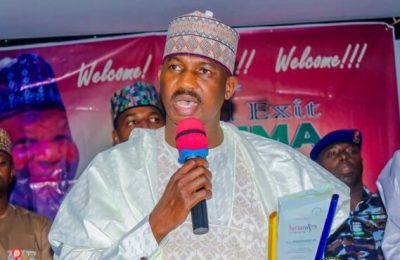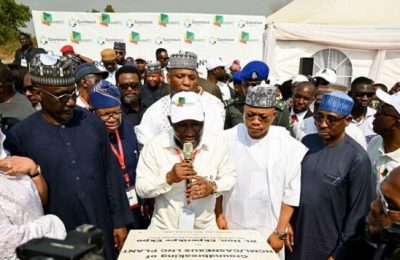
IT seemed uncertain when in 2023, President Bola Tinubu hinted of his agenda of steering the nation towards attaining $1 trillion economic growth by 2030, given the devasted state of the economy he inherited in 2023. But not deterred by the state of the economy, the Executive, deploying its targeted fiscal policy initiatives in sync with the monetary policies of the Central Bank of Nigeria (CBN), has its eye set on the target.
In fact, President Tinubu brought down the period of the attainment of the ambitious target while speaking at the 29th edition of the annual Economic Summit, when he reiterated; “distinguished ladies and gentlemen, a $1 trillion economy is possible by the year 2026 and a $3 trillion economy is possible within this decade. We can do it.”

At the centre of measures towards the achievement of this target lies in the implementation of sound monetary policy measures of the Central Bank of Nigeria (CBN) through the Deposit Money Banks (DMBs) which deploy funding to productive ventures for sustainable economic development and growth. Along this line of thinking, President Tinubu directed the “creation of a new single-digit interest-rate Fund to provide N75 billion to support manufacturing enterprises, among other targeted financing interventions.
While speaking late last year in Lagos, at a forum with the theme: “Nigeria’s Journey Towards a $1 trillion Economy: Impact of
Banks’ re-capitalisation, Opportunities for Fintechs and Real Sector” Isa Omagu, the Divisional Head of Services, Bank of Industry (BoI), harped on the need for synergising the fiscal and monetary policies to enhance productive capacity of the country to shield it from being import dependent.
Also, Mr. Bello Hassan, the Managing Director and Chief Executive Officer of the Nigeria Deposit Insurance Corporation, reiterated the indispensable role of banks in activating and sustaining productive capacities of every nation, and reasoned that recapitalising the nation’s banks is expedient to enhancing resilience, solvency and capacity of Nigerian banks to absorb shocks and continue to support the economic development of the country.
Against this background, most banks have stepped up their recapitalising drive to enable them deploy funding to productive and development initiatives aimed at attaining a $1 trillion economic growth by 2030.
Recall that the last banking recapitalisation was effected by the then CBN Governor, Prof. Chukwuma Soludo between 2004-2005, raising capital base requirement of each bank from N2 billion to a minimum of N25 billion. The outcome of the implementation stimulated financial stability, economic growth and shielded the nation from the 2008-2009 worldwide economic recession.
Since then, Nigerian banks have become more involved in the economy by lending to critical sectors on a more sustainable basis. On a good number of occasions, not a few Nigerian banks have gone to the capital market, on their own, to raise additional capital in support of their businesses.
Years down the line and buoyed by the manifest impact of the previous capital injection exercises on the financial health of the banks and subsequent economic growth, the CBN Governor, Olayemi Cardoso, in March 2024, rolled out a comprehensive two-year (April 1, 2024- March 31, 2026) banking recapitalisation programme for Nigerian banks.
Under the ongoing initiative, titled: “review of minimum capital requirements for commercial, Merchant and Non-Interest Banks in Nigeria”, commercial banks with international coverage will require N500 billion, while commercial banks with national and regional coverage will require N200 billion and N50 billion respectively. Merchant banks will require N50 billion to play at national level whereas non-interest banks will require N20 billion for national coverage, and N10 billion for regional operations.
One unique condition, attached to the capital raising, according to the CBN circular announcing the commencement of the programme, is that “ the minimum capital specified above shall comprise paid-up capital and share premium only, and shall not be based on shareholders’ fund”
The apex bank, in the circular advised banks to opt for any of the following: “private placements, Rights Issue and or offer for subscription, Mergers and Acquisitions and or upgrade or downgrade of license authorisation”.
With the CBN’s mandate, many banks have begun the implementation of the funds- raising in phases with many of them completing the first tranche of their fundraising. They Many banks have submitted their proceeds to the regulators – CBN as well as to the Securities and Exchange Commission (SEC) for verification and approval. Already, five banks are cited to have raised a total of about N1.185 trillion from equities market in the first phase. The banks include: GTCo (N209.41 billion), Access Holdings (N351 billion), Zenith Bank (N350.46 billion), Fidelity Bank (N127.1 billion), and FCMB Group (N147.5 billion). (Note: these figures may change depending on what was approved by the regulators)
According to close watchers of the recapitalisation exercise, the outcome,
thus far, has been positive. It is expected that interest in the exercise will increase, exponentially, between now and the end of 2025 as the countdown to the April 2026 deadline approaches. The quantum of investment that is being driven by the banks through the exercise can better be appreciated when considered against the number of banks that are participating.
According to figures as at April, 26 2024, there are 36 commercial, Merchant and Non-Interest Banks with either international, national or regional authorisations; including Heritage Bank which was later liquidated by the CBN. A breakdown of the existing entities indicates that the nation currently has seven commercial banks with international authorisation, 14 commercial banks with national authorisation, four commercial banks with regional authorisation, four Non-Interest Banks with national authorisation and six Merchant banks with national authorisation. The number is expected to rise given that there are so many applications for banking licenses that are awaiting approval of the CBN.
Although the appetite for foreign investment in Nigeria, in the last couple of years, has remained relatively low; due largely to unfavourable business climate, Nigerian banks have retained the market confidence, and is leading investments towards the attainment of the projected $1trillion economy by 2030.
It is believed that the sustained interest of investors in the financial services industry, particularly, the banks, is not only a proof of confidence in the banks but also a strong indication of high prospects of return on investment (ROI) in the sector.
- Eke is the CEO Barntrends Services Limited
READ ALSO: Investment managers urge Central Banks to balance price stability with economic growth








